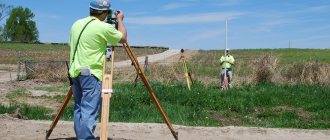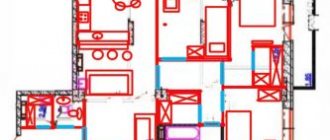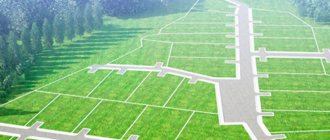What are land disputes
These disputes are a claim to the right to own or use a plot of land by two or more persons, for example: recognition of rights, division, determination of boundaries, removal of obstacles to the use of a plot of land, reclaiming a plot of land from someone else’s illegal possession.
- Regarding ownership issues - a conflict situation related to a violation of the location of the boundaries of a land plot, rights are confirmed by an extract from the Unified State Register.
- Regarding issues of use - a conflict associated with a violation of the rights of the owner of a land plot to derive income from the use of a land plot, causing damage through improper use of a neighboring plot, destroying crops or causing harm that creates a threat of destruction of property.
- Regarding issues of disposal - illegal sale of the same plot to two or more subjects of land legal relations. Read more: Land law.
Today, the land legislation of Russia does not contain a definition of such a dispute, unlike other industries; for example, the Labor Code of the Russian Federation provides a definition of both individual and collective labor, which are determined through unresolved disagreements.
However, despite this, this term is repeatedly used in the Land Code of the Russian Federation. Thus, Chapter IX of the Code is called “Protection of land rights and consideration of these conflicts.” In paragraph 1 of Art. 64 of the RF Land Code talks about consideration of these disputes in court, etc.
In this regard, we believe that one of the shortcomings of the current legislation is its lack of definition of this dispute. In this section we will look at key disputes, as well as their defense in court.
An analysis of regulatory legal acts regulating land relations has shown that currently at the legislative level there are no provisions regulating issues related to the organization of prevention of these disputes, the subjects of preventive activities and their powers in the field of prevention are not indicated. In this regard, the relevance of scientific research into the problems of preventing disputes is beyond doubt.
The main causes of disputes are:
- shortcomings in current legislation;
- shortcomings in communicating the content of newly adopted regulatory legal acts to subjects of land relations;
- shortcomings in the work of government officials;
- unfair behavior of individual subjects of legal relations.
Land disputes, as a rule, concern the emergence, change and termination of rights of land users. Disputes can arise both between land users and between them and government bodies regulating land relations.
Resolution of a land dispute is a legal relationship regulated by the norms of land, civil, civil procedural and arbitration procedural law.
Land legal disputes are specific in that their object is always land, which appears as such directly or indirectly. These are disputes regarding the provision, withdrawal, procedure for using land, as well as reimbursement of costs arising in connection with land relations
Review of judicial practice
Where can conflicts regarding the establishment of boundaries on their own plots or cases of violation of property rights or other controversial issues be considered? When a dispute arises, it is important for the injured party to know which court hears conflicts over land, how to win a claim, and what documents need to be prepared before filing an application.
- Disputes are mainly heard in courts of general jurisdiction.
- If a conflict arises between business entities, it will be dealt with by an arbitration court.
- If a corresponding agreement arises between business entities, the case on the controversial issue is sent to an arbitration court.
It should be taken into account that special commissions work under municipalities, whose task is to resolve issues related to the provision of land area in ownership, to determine the boundaries of the site. They can indicate what the actual use of the land should be in accordance with the WRI.
If possible, you can first turn to such a commission to resolve the dispute, so as not to start lengthy legal proceedings. Also, in such a commission, specialists will tell you in which courts land disputes are resolved and how to collect the necessary documents.
IMPORTANT! The limitation period for civil cases is three years.
To consider a land case, the injured party draws up a claim using a sample that can be obtained from the court office. The claim must specifically describe the situation, the essence of the conflict, and how the owner’s rights were violated. What other information should be in this document?
- Address of the court, its name.
- Installation information of the plaintiff and opponent.
- Information about those persons who will testify on behalf of the plaintiff.
- A detailed description of the conflict situation that has arisen.
- Precisely formulated requirements for the opponent.
- A petition to apply the necessary measures to resolve the conflict.
- Another column is the cost of the claim.
When filing a claim in court, you must remember to notify other parties to the conflict about the upcoming trial. Sometimes the threat of a summons to court has a positive effect on the violator, and he will offer the injured party a peaceful solution to the issue with the restoration of violated interests.
In its actions, the court uses land legislation, as well as the Resolutions adopted in this area by the Plenum of the Supreme Arbitration Court of the Russian Federation, and other documents.
Regulatory Dispute Database
What legislative basis does the court rely on when there is a trial regarding such an important issue as a land dispute? This:
- Civil Code of the Russian Federation.
- Civil Procedure Code of the Russian Federation.
- Land Code of the Russian Federation.
- Arbitration Procedural Code of the Russian Federation (in case of disputes between economic and other business entities).
- Federal Law of July 13, 2015 No. 218-FZ “On State Registration of Real Estate” (especially Chapter 3).
- Other laws and regulations that directly or indirectly regulate the circulation of land plots (for example, the town planning code).
It is on these legislative acts that the court's decision is based.
Main types of litigation
A study of judicial practice related to the consideration of these disputes has shown that today the most common reasons for their occurrence are:
Determining the boundaries of the site
In boundary determination cases, issues such as:
- liberation of land occupied without permission,
- restoration of site boundaries,
- challenging the survey results,
- correction of cadastral errors (courts note that errors occur even when cadastral work is carried out with modern devices),
- directly establishing boundaries.
Such disputes do not depend on the facts of demarcation of plots, cadastral registration and registration of rights to them. The courts resolve these cases taking into account the actual boundaries.
As a means of proving the boundaries of a site, you can use:
(Practice of considering these disputes of the Penza Regional Court)
- fence,
- location of buildings,
- difference in heights in the ground (for example, if there was no fence, but there was a boundary),
- difference in soil types,
- witness's testimonies,
- archival materials of inventory files for households,
- accelerated inventory materials,
- the results of the examination, which is necessary in almost all cases of this category.
Recognition of the right to a plot
The main reasons for this category of proceedings are:
- lack of title documents for land,
- refusal of the authorized body to privatize or register the right to a plot,
- desire to bypass the legal procedure for acquiring land rights.
The court confirms the already existing fact of legal possession of land, and does not create it. For example, a person gardened or built a house on inherited land, but did not register ownership. When going to court, the applicant must have evidence that he has this right, otherwise the court will make a decision not in his favor (clause 59 of the Resolution of the Plenums of the Armed Forces of the Russian Federation, the Supreme Arbitration Court of the Russian Federation No. 10/22 of 04/29/2010 “On some issues arising in judicial practice when resolving disputes related to the protection of property rights and other property rights"). In the example given, this is a certificate of inheritance.
If a dispute arose over a decision made (actions or inaction) by an authority, it is necessary to challenge the refusal to provide a land plot.
Removing obstacles to the use of the site
An application to remove obstacles to the use of a land plot should be sent to the court only if the boundaries of the plot have already been determined and there are documents confirming ownership or other legal right of possession. We also need evidence of the defendant's actions or inactions that violate the plaintiff's statutory rights. In practice, the reasons for litigation are:
- erecting a fence (a very common reason),
- construction of a neighboring house in violation of town planning and building codes and regulations,
- smell from keeping animals, etc.
The court will satisfy the request if there is a real violation of rights or the plaintiff is able to prove the existence of a real danger of violation of his rights (resolution of the Presidium of the Moscow Regional Court dated July 1, 2015 No. 299).
Determination of the cadastral value of a land plot
As is known, the cadastral value of real estate, used to calculate taxes and rent, is often in practice higher than the market value. You can get it reduced in court.
If the report on determining the market value of a land plot and a positive expert opinion comply with the requirements of the law and valuation standards, then the cadastral value of the land plot should be established in the amount of a certain market value (Resolution of the Plenum of the Armed Forces of the Russian Federation dated June 30, 2015 No. 28 “On some issues arising when consideration by courts of cases challenging the results of determining the cadastral value of real estate objects”, determination of the Judicial Collegium for Administrative Cases of the Armed Forces of the Russian Federation dated 05.08.2015 No. 67-APG15-40).
Land ownership
Ownership of land arises for both citizens and legal entities, so the issue of recognition and registration of land ownership is relevant for everyone.
Thus, ownership of land arises:
- based on decisions of state authorities and local governments;
- on the basis of contracts and other transactions with land;
- due to acquisitive prescription;
- based on a court decision;
- as a result of accepting an inheritance, etc.
The process of recognition and registration of land ownership takes quite a long time, and therefore, endurance and patience are required in this matter.
In addition, this process (registration of land ownership) involves the involvement of various types of specialists: lawyers, surveyors (persons involved in land surveying), etc., who will have to carry out competent and coordinated work on land surveying, coordination of its boundaries with all adjacent land users and in various authorities, obtain the relevant documents on the provision of land ownership (orders, resolutions, etc.), and in the event of a corresponding refusal to provide land ownership - appeal the said refusal in court, and finally, register ownership of the land plot with the relevant judicial authority.
As a result, registration of land ownership requires the necessary knowledge on this type of issues, which can only be handled by a true professional in his field, namely, a lawyer specializing in the field of land law. Only such a specialist will be able to provide you with highly qualified legal services on all issues of land law.
Jurisdiction of land disputes
at least one of the parties is a citizen who does not have the status of an entrepreneur, or when such status exists, but the case did not arise in connection with the implementation of entrepreneurial activities, as well as complaints from these persons about the actions of the administration on land issues.
The courts, in particular, have jurisdiction over:
- demands to recognize as unlawful the refusal of the local administration to provide a land plot, including for the creation of a peasant (farm) enterprise, running a personal subsidiary plot, building an individual residential building, for individual gardening and horticulture, grazing livestock;
- complaints about the refusal to register and issue by the administration state acts certifying the ownership of land, as well as the refusal to register a concluded land purchase and sale agreement; c) demands to recognize as unlawful the termination of the right of ownership and use of land plots and their lease by the local administration;
- complaints from land owners and land users against the decision of the local administration upon preliminary approval of the location of an object, the construction of which requires the seizure of a land plot for state and public needs;
- requirements for recognition of the preemptive right to inherit a land plot after the death of the head of a peasant (farm) enterprise, as well as for the preemptive right to inherit a land plot for personal farming, housing, dacha, garage construction, entrepreneurial activities, gardening and livestock breeding;
- demands to recognize as unlawful the administration’s refusal to provide an official allotment and the refusal to preserve the right to use an official allotment for persons listed in the legislation;
- claims for compensation for losses caused by the seizure, redemption or temporary occupation of land plots for state and public needs, restriction of the rights of land owners, land users, or deterioration in the quality of land as a result of influence caused by the actions of enterprises, institutions, organizations and citizens;
- claims for compensation for losses caused as a result of unlawful occupation of land by pollution, damage and other violations of the rights of land owners and land users;
- claims for compensation for losses incurred by the land owner and land users during survey work;
- requirements for reimbursement by the local administration of the costs incurred for improvement in the event of voluntary termination of the right to lifelong inheritable possession and use of plots and their lease, as well as demands of the local administration to the landowner or land user for compensation for damage associated with deterioration in the quality of the land and damage to the land;
- complaints against decisions of the local administration on the provision of a land plot, if the rights and legally protected interests of the owner or land user are infringed (for example, as a result of the decision of the local administration, they are deprived of access to their land plots);
- disputes between the owners of individual residential buildings located on adjacent land plots regarding the elimination of obstacles to the use of the land plot, in which its boundaries and dimensions are disputed;
- disputes between a horticultural non-profit association and its members, as well as disputes between spouses, including former ones, regarding the division of land and determination of the procedure for using this site;
- disputes between members of a dacha non-profit association and the said association regarding the procedure for using a land plot and its division
Types of land disputes in court
Land disputes, depending on the method and procedure for consideration in court, are divided into:
- Disputes in which a preliminary out-of-court procedure is followed.
- Conflicts that are considered in the courts.
- Disputes that are submitted by conflicting parties to arbitration.
With regard to disagreements regarding the implementation of rights and obligations, disputes are divided into:
- Those that require recognition of the land plot in court.
- Disputes requiring an award of performance regarding certain actions or abstention from performance.
- Disputes concerning the termination or change of land legal relations.
But that's not all. Cases in court can be divided depending on how they will be considered:
- Cases that are considered by the court in compliance with the pre-trial procedure for resolving a conflict situation.
- Cases that will be considered in the courts.
- Those cases that are considered in arbitration.
Let's look at some of the land disputes in more detail.
Conflict related to border violations
When the question concerns the boundaries of the land, there are always many omissions. It is very difficult to understand exactly where it is located without surveying engineers. Therefore, even when buying an old plot, one cannot be completely sure that the boundaries established by the old owner are set correctly. After all, after time, the fence, due to natural conditions or the desire of the previous owners, could be “redirected” in any direction. Therefore, land disputes requiring a court decision and related to incorrect placement of boundaries appear very often.
Example. Let's assume that a certain Oksana inherited a house, which she successfully demolished, removing all the old things from it, and began new construction. And everything would have been fine, but the hut that the old owners had burned down, and the ashes along with the fence were leveled by a bulldozer. It turned out that the woman had nothing to look up to.
Relying on her old memories, Oksana laid the foundation and built a new house. But in the end it turned out that her house climbed 2 meters onto the plot of another owner, who had purchased a neighboring plot.
As a result, a dispute arose between the owners, which was resolved out of court. Oksana paid Yulia 200 thousand rubles, after which a new survey was carried out and the boundaries of what was “permissible” were established.
Land disputes regarding the area of the plot
Such conflicts that require a court decision may arise if the land surveying was not carried out with sufficient quality or was carried out many years ago. As a result, one area will be written down in the papers, although in fact it will turn out to be completely different. The new copyright holder orders measurements and, on the basis of a new document, tries to get back the overpaid funds. Accordingly, to resolve the land dispute, he goes to court
Note! A situation of this type can also arise when, due to the fact that the area was calculated incorrectly, a higher land tax is charged. In this case, the court appoints a forensic assessment examination with measurements of the existing site.
Confiscation of land for government needs
In some land disputes that are mentioned in the Land Code, the State can legally seize a plot from the rightful owner. In this case, the owners of the plot are paid compensation equal to the market price of the plot. However, many questions may arise here, because the amount of compensation may depend on the competence of the appraiser and on how good his relationship with the authorities is (it happens that the appraiser himself is interested in incorrectly calculating the value of the land plot).
As a result, the owner of the plot also hires an independent appraiser, and his amount of compensation may differ significantly from the amount of compensation of a state appraiser. In this type of land dispute, one of the parties is the municipality or even the state.
Land disputes regarding ownership
This type of dispute can arise when someone tries to challenge your ownership. Most often, such situations are associated with inheritance, when relatives remain dissatisfied. It also happens that the owner of the plot of land has owned it for a long time, but has never formalized it properly. Then a land dispute arises that requires a court decision.
Additionally, you can watch the video about exactly what documents you need to check when buying a house.
If such a land dispute arises, then you need to go to a court of general jurisdiction, which considers just such issues. This is done if there are those who are dissatisfied with your right to the land plot. If no one disputes the right of ownership, then the conflict is resolved in accordance with the dacha amnesty, and no court decision is required.
Conflicts regarding illegal actions of government agencies
Government agencies are not always cooperative and eager to help citizens. Every day thousands of disagreements arise regarding the transfer of a land plot to another category, the imposition of easements, the allocation of land to beneficiaries, disputes about privatization, and so on.
Note! Of course, it is very difficult to challenge the actions of government agencies, because a professional lawyer will be against you. However, who is stopping you from also hiring a professional lawyer?
Recommendations on land disputes
It is definitely better to refer any disagreements that arise in the field of land legal relations to an experienced lawyer who will give the necessary advice, help collect the necessary evidence, and try to reach an agreement with the opponent (be it a citizen, organization or government body) with maximum benefit for the principal.
If you cannot reach an agreement, you need to create a package of documents and send it to the court, and then defend the position stated in the application. This is also the work of a lawyer, whose fees must be reimbursed by the losing party (including from the treasury).








